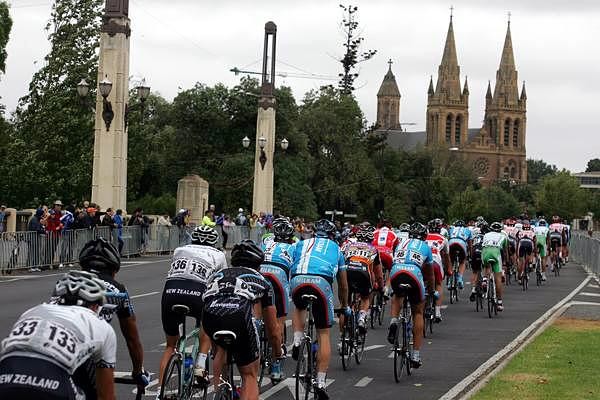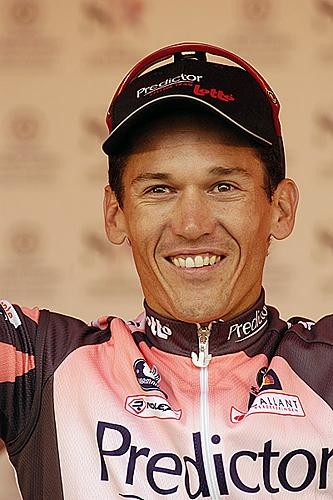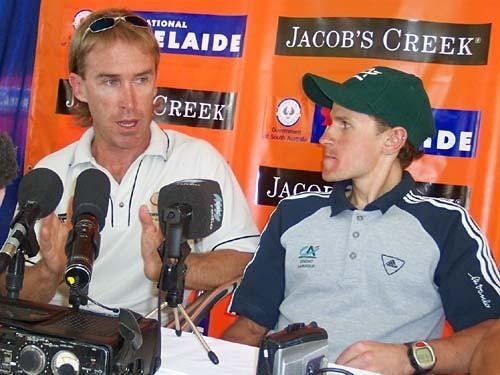Aust ProTour team finds foundation supporter
By Gerard Knapp The Australian businessman Tony Smith has announced his intention to provide the...



By Gerard Knapp
The Australian businessman Tony Smith has announced his intention to provide the seed capital for the establishment of an Australian-registered ProTour team, providing further evidence of growing momentum for cycling in the sports-mad country.
Smith was at the Tour Down Under in Adelaide, along with his CEO of ProTour Cycling, Dr Paul Varcoe, for further meetings with officials from Cycling Australia and the Australian Institute of Sport (AIS). They were also there to follow the race. Both Smith and Varcoe are keen cyclists, but it's not just their interest in the sport that drives this plan - it's also about developing a sound marketing vehicle for other Australian businesses.
Dr Varcoe told Cyclingnews, "I would say it represents good value for money. It depends on the product and service you've got to deliver and if that (cycling) is appropriate".
"At the moment we're preparing sponsorship documents to take to corporate Australia," he said. It's understood that Smith will commit up to 2 million Euros towards a ProTour team's annual budget, estimated of anything from six to 15 million Euros, depending on the size of the team and its race program.
Dr Varcoe said they will target those companies that have "interests here (Australia) and in Europe". At the same time, "we've already been approached by European companies with interests in Australia". The search for a co-sponsor may need to head offshore, largely because the marketing return-on-investment could be more suited to European or American interests.
Dr Varcoe said that ProTour licences become available at the end of 2008 and that suits their timing, as many of the possible Australian riders are also contracted for the next two years.
Get The Leadout Newsletter
The latest race content, interviews, features, reviews and expert buying guides, direct to your inbox!
"It's also nice to be coming into the sport with it a little bit more settled," he said, a reference to the doping issues that have plagued road cycling. Then there is the concurrent issue of the UCI versus the Grand Tour organisers, but the latter is not perceived as a major issue. The Australian said, "the events won't die (if not part of the ProTour)" and if there is a definite split between the major events owned by the 'big three' (ASO, RCS, and Unipublic), "in some ways that's not a bad way to go. You might end up with more French teams in the Tour de France, but that's to be expected".
Dr Varcoe believed an Australian-registered team would still be likely to receive invitations to the major cycling events, regardless of the ProTour or not, due to the quality of the riders and the nation's sporting reputation.
Australia's male road cyclists are collectively ranked fifth in the world, but almost all are locked into multi-year deals with the world's leading teams. The country's best young riders are now being signed to the world's top European squads as teenagers, as the sport starts to take on aspects of Premier League football, where talent scouts travel the world looking for the best youngsters to sign up in the hope they turn into the next Harry Kewell.
The country's coaches and major sports institute have responded by forming the South Australia.com - AIS squad, which has already produced two ProTour-level riders in Matt Goss (CSC) and Matt Lloyd (Predictor-Lotto).
An Australian-registered team would not want for riders. At the upcoming Tour de France, it's likely that two of Europe's top squads, Belgium's Predictor-Lotto and Germany's T-Mobile, will be led by Cadel Evans and Michael Rogers, respectively, while Robbie McEwen will aim to secure his fourth sprinter's jersey in the TdF, and he is Evans' teammate. At last year's UCI Road World Championships in Salzburg, the Australian team was seen as one of the favourites.
Varcoe doesn't expect the team will be on the road until 2009 at the earliest, given the amount of time it will take to not only finalise the sponsorship and infrastructure, but also wait for some of Australia's top cyclists to become available.
There has been talk of an Australian-registered (and funded) team competing at the sport's highest level for years, but the emergence of Smith has many in the sport believing it will genuinely happen.
The former Australian pro cyclist Neil Stephens, now a professional cycling coordinator for Cycling Australia, said in an interview late last year, "If you can try to associate the business world with nationalistic pride, it is big step for the world of cycling. Unofficially, Discovery is counted as the American team. T-Mobile, up until now, has been seen as the German team. Astana is going to be, really, the Kazakh team. That is fantastic. So why can't we have the Australian team? There have been several attempts in the past, but I think we should all sit back now, have a good think about it and try to work something out."
The financial pledge from a successful businessman is indicative of the new money coming into cycling Down Under. In 2004, there were few Australian professional teams, and none registered with the UCI. Now there are four, including one Professional-Continental team, and it could be argued these teams are in need of a stronger Oceania competition base to generate the exposure and return to sponsors. Earlier this month, the country's first Professional-Continental team dominated its national championships, accounting for a smattering of ProTour-team riders. It has to be said that the ProTour riders are at different phase of their training, but the performance of the Drapac-Porsche team did not go unnoticed.
As for the sport's new investor, Tony Smith, 42, is a former 'Aussie Rules' player who moved to Queensland in the late '80s and acquired his wealth via strategic investments in the tourism industry. In fact, one of his first successes was to offer holiday and accommodation packages to high school-leavers who would hit the holiday strip at Surfers Paradise on the Queensland coast, to let their collective hair down. This became known as "Schoolies Week", and now attracts tens of thousands of school-leavers each year.